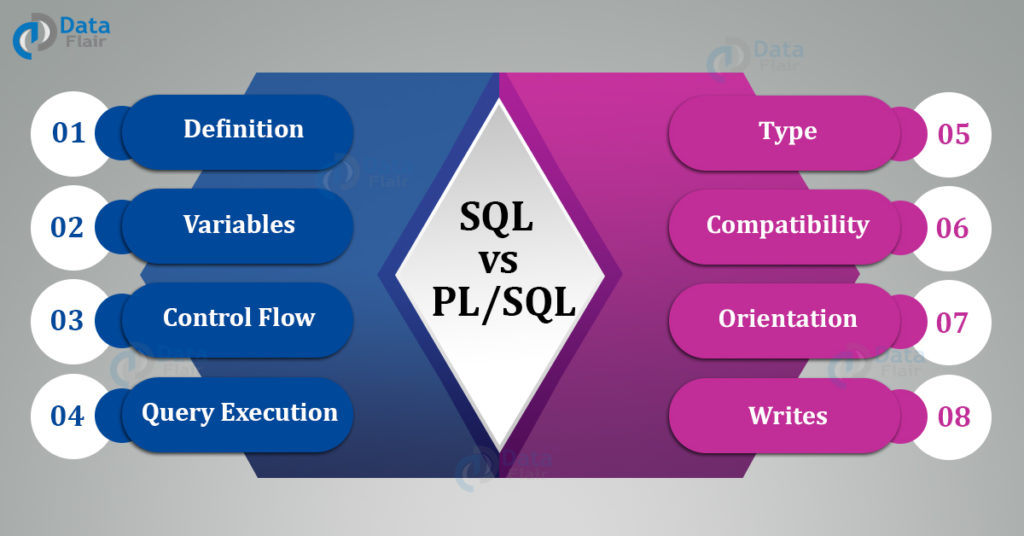FREE Online Courses: Transform Your Career – Enroll for Free!
In this tutorial, we will understand what SQL and PL/SQL are and the use cases of each of them. We aim to understand the situations when we should put which one to use.
We know that SQL is the query language for the database and is easy to use with the available tech-stack because of the available plugins and supports.
When we talk about PL/SQL it is the Procedural Language that uses SQL as its backend. It has the power to combine both the SQL and high-level procedural statements to obtain better results.
Let us now dive more into both SQL and PL/SQL and understand the use cases and the differences between them.
What is SQL?
SQL or more popularly known as “See-quel” is a Structured Query language, which is used to perform CRUD operations on the databases.
It supports the creation, alteration, and deletion of databases. It is a widely used query language compatible with almost all tech stacks that are currently in use.
SQL has in-built plugins and packages in almost all high-level languages to create and manage database connections.
Some of the characteristics of SQL are as follows:
- It is a query language.
- It has wide compatibility and is scalable.
- SQL has a simple query structure making it easy to be used even by beginners.
- It helps in managing and scaling the databases.
- It provides us with vast datatypes making it a preferred choice to be used as the query language in almost all fields.
What is PL/SQL?
PL/SQL or more popularly known as Procedural Language extensions to SQL is a high-level language which gives us the power to use procedures with SQL.
Technology is evolving rapidly!
Stay updated with DataFlair on WhatsApp!!
PL/SQL is a procedural language that uses SQL as its database. With the help of PL/SQL, we can use conditional and iterative statements on the otherwise normal SQL queries.
This makes it easy for us to draw structured insights from the data.
PL/SQL allows us to use the if-else block and the iterative loops like for and while in the SQL queries.
Some of the properties of PL/SQL are as follows:
- PL/SQL has a block structure and is written in the form of blocks of logical code units.
- It provides us with the freedom to use procedural concepts, like iteration and conditional statements with SQL queries.
- PL/SQL is preferred when we need to store procedures and maintain the log.
- PL/SQL provides us with the inbuilt blocks to handle errors and manages them using the inbuilt error handling modules.
- It provides us with the capability to create variables that can last for the execution of the procedural program.
Differences Between SQL and PL/SQL
| Sr.No | Property | SQL | PL/SQL |
| 1 | Definition | Structured Query Language or SQL is a query language used to perform CRUD operations on databases. | PL/SQL or Procedural Language Extension for SQL is a high-level language which uses SQL as its backend. |
| 2 | Variables | SQL can’t define variables | PL/SQL gives us the freedom to use variables. |
| 3 | Control Flow | Control flow managers are absent. | Here, Control flow managers like if-else are present. |
| 4 | Query Execution | SQL executes queries one by one. | PL/SQL executes queries in block form. |
| 5 | Type | SQL is a declaration-based language. | PL/SQL is a procedure focussed language |
| 6 | Compatibility | SQL can be used within PL/SQL. | PL/SQL code can’t be embedded in SQL. |
| 7 | Orientation | SQL is a data language. | PL/SQL is a functional language. |
| 8 | Writes | Used to write DDL and DML queries. | Used to write blocks and functions of logical programs. |
| 9 | Use | Allows us to develop server pages that help us to display the data output from the query. | Allows us to build applications that use SQL as the backend to display the retrieved data from SQL queries. |
| 10 | Scalability | SQL is scalable when added with another supporting technology. | PL/SQL is scalable on an individual level. |
| 11 | Interaction with Server | SQL directly interacts with the database server. | PL/SQL never interacts directly with the database server. |
| 12 | Error Handling | SQL doesn’t support error handling. | PL/SQL has built-in error handling modules. |
| 13 | Purpose | Helps us to create and maintain data and also helps in analyzing the data. | Allows us to create applications using SQL as a backend and logical code execution. |
Summary
In this tutorial, we have understood SQL vs PL/SQL. We have seen the use cases where to use which database. And the properties of each of them.
We have then focussed on the differences between SQL and PL/SQL based on various parameters like the functionality and the variables, error handling etc.
